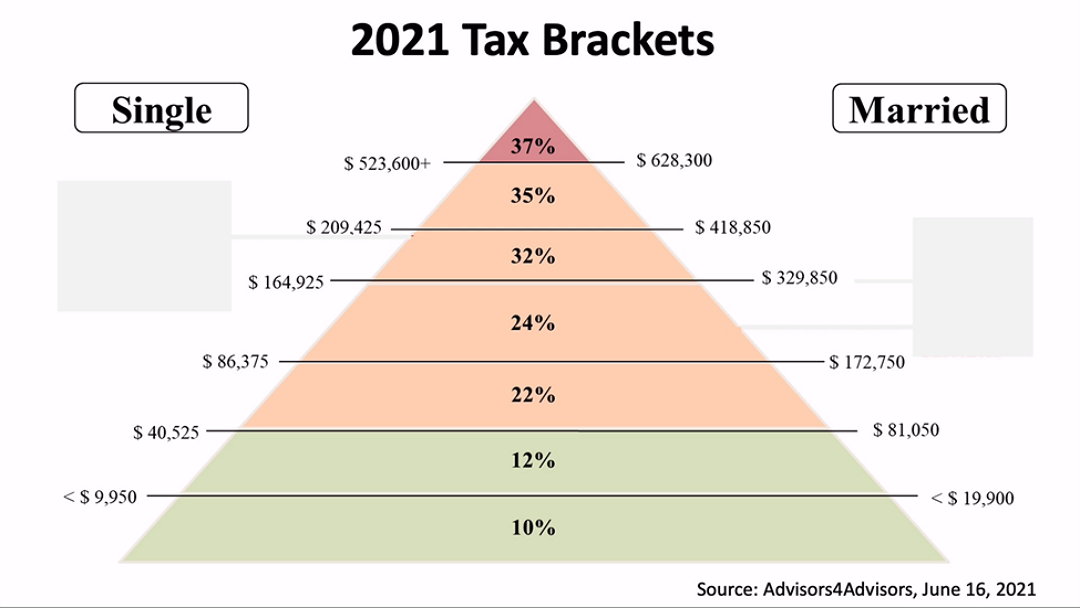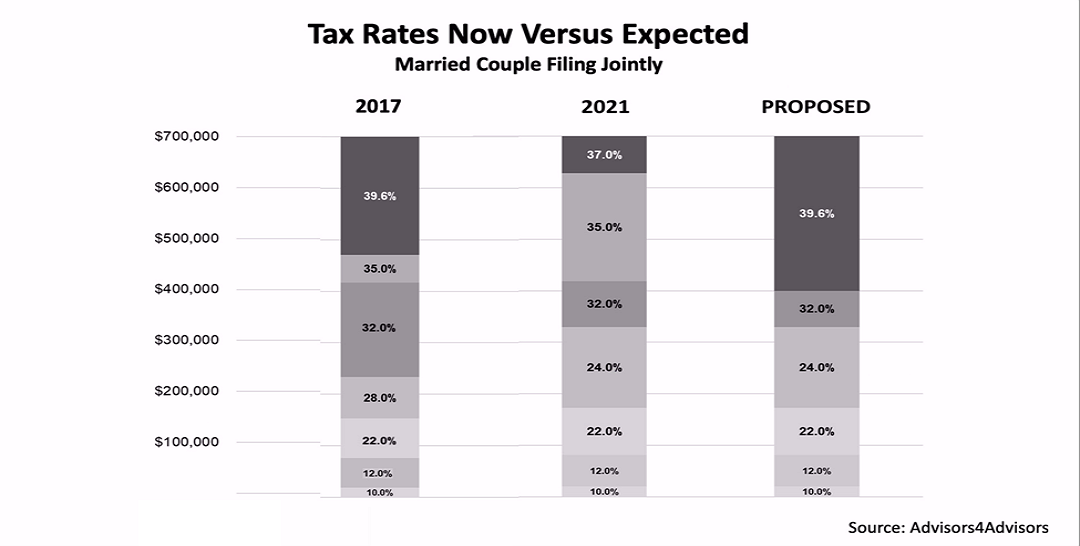Is The Expected Income Tax Hike Going To Affect You?
Published Monday, September 6, 2021 at: 8:40 PM EDT
An income tax hike is widely expected, but the important question is how it would affect your personal situation. Here's help in understanding and planning for the expected change in tax brackets.
The Biden Administration has proposed not only raising the top income tax bracket from 37% to 39.6% but also expanding the 39.6% bracket to capture more taxpayers. The bars below show the marginal tax brackets in President Biden’s proposal versus the brackets in effect in 2021, and the marginal rates before President Trump's tax cut was enacted in December 2017.
The top marginal tax bracket of 37% in 2021 is down from 39.6% before the 2017 Trump tax law. Under the Biden proposal, the top tax rate of 39.6% would be restored. In addition, the 35% bracket would be eliminated and income of more than $414,701 would be taxed at the 39.6% rate! To be clear, the top tax bracket affects joint-filers with more than $400,000 in income versus the current $628,000, and the top bracket would rise from 37% to 39.6%.
The exact tax brackets and their effective dates remain uncertain but are expected to be decided by Congress before the end of 2021. This will make year-end tax planning more critical. Depending on the outcome of the political wrangling in Congress in the final four months of the year, individuals will want to try to shift income and bunch deductible expenses to avert or at least manage the tax bracket changes expected to be adopted.
Nothing contained herein is to be considered a solicitation, research material, an investment recommendation, or advice of any kind, and it is subject to change without notice. Any investments or strategies referenced herein do not take into account the investment objectives, financial situation or particular needs of any specific person. Product suitability must be independently determined for each individual investor. Tax advice always depends on your particular personal situation and preferences. You should consult the appropriate financial professional regarding your specific circumstances. The material represents an assessment of financial, economic and tax law at a specific point in time and is not intended to be a forecast of future events or a guarantee of future results. Forward-looking statements are subject to certain risks and uncertainties. Actual results, performance, or achievements may differ materially from those expressed or implied. Information is based on data gathered from what we believe are reliable sources. It is not guaranteed as to accuracy, does not purport to be complete, and is not intended to be used as a primary basis for investment decisions. This article was written by a professional financial journalist for Advisor Products and is not intended as legal or investment advice.
This article was written by a professional financial journalist for Preferred NY Financial Group,LLC and is not intended as legal or investment advice.
An individual retirement account (IRA) allows individuals to direct pretax incom, up to specific annual limits, toward retirements that can grow tax-deferred (no capital gains or dividend income is taxed). Individual taxpayers are allowed to contribute 100% of compensation up to a specified maximum dollar amount to their Tranditional IRA. Contributions to the Tranditional IRA may be tax-deductible depending on the taxpayer's income, tax-filling status and other factors. Taxed must be paid upon withdrawal of any deducted contributions plus earnings and on the earnings from your non-deducted contributions. Prior to age 59%, distributions may be taken for certain reasons without incurring a 10 percent penalty on earnings. None of the information in this document should be considered tax or legal advice. Please consult with your legal or tax advisor for more information concerning your individual situation.
Contributions to a Roth IRA are not tax deductible and these is no mandatory distribution age. All earnings and principal are tax free if rules and regulations are followed. Eligibility for a Roth account depends on income. Principal contributions can be withdrawn any time without penalty (subject to some minimal conditions).
©2021 Advisor Products Inc. All Rights Reserved.


